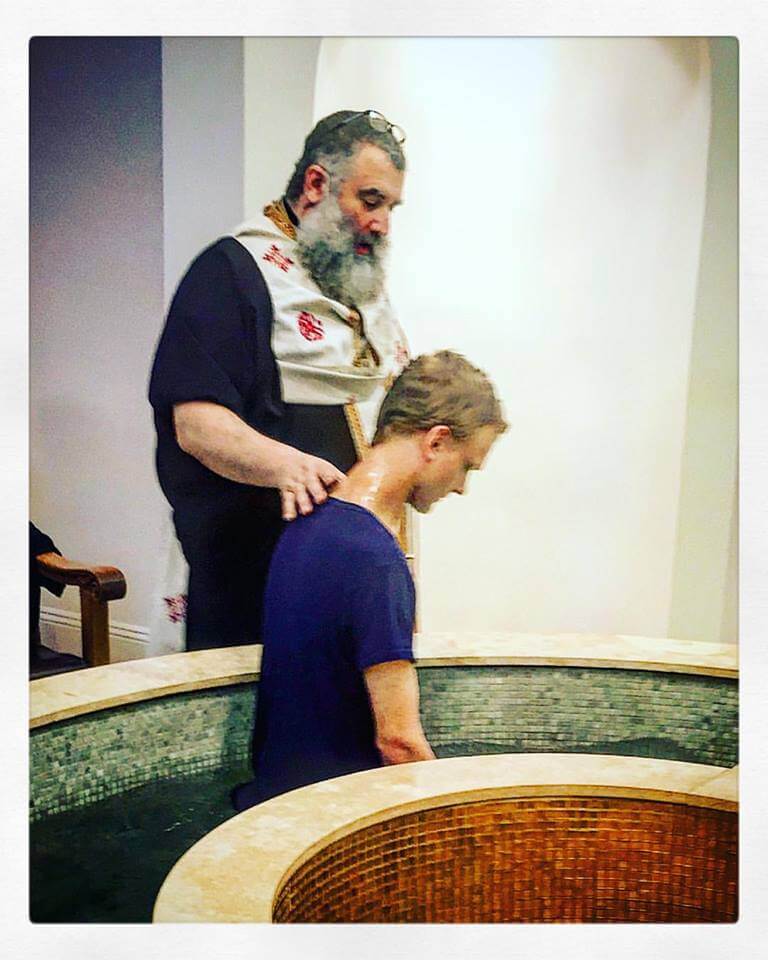Another movement that the media fails to bring to your attention: the massive
conversions of Protestants to Eastern Orthodoxy, the original form of
Christianity.
More than 79% of clergy in Orthodox Churches were previously
pastors of various denominations. There have been cases of
entire parishes converting to Orthodoxy.
As some
pastors-turned-priests explain, the switch is the 'natural'
result of spiritual barrenness and dissatisfaction, as
Protestant denominations adopt liberal stances and values,
for example, legitimizing homosexuality.
These
departures from normal Christian morals disappoint people
and they start looking for the True Church.
The turning
point was 1987 when 2,000 evangelicals from the Dallas
Theological Seminary in Texas converted to Christianity.
A Russian
bishop, Metropolitan Hilarion Alfeev, interviewed towards
the end of the video, explains:
"Now in
Protestant Churches and the Church of England, processes are
taking place which bring believers to the question: Does it
even make sense to remain in such a church?
I must say
straight out that we do not consider the Protestant
Church and the Church of England to be "Churches' in the
true sense of the word. Because they don't have, probably
the most essential characteristics of the Christian Church.
They don't have the true comprehension of the sacraments,
they've lost the Apostolic succession of hierarchy. And for
the past 10 years, they have undergone such a horrifying
process of liberalization that traditional Christian
morality is not preached any longer in their churches."
Video:
https://youtu.be/UP4pQXGIeYs

5 Major
Differences Between Orthodoxy and Protestantism
A popular American priest explains how the original Christian church, which
is called Orthodoxy, differs from modern Protestant
teachings.
Video:
https://youtu.be/3MzWnO1VfvY
In this video, he explains 5 major differences between Evangelism and
Orthodox Christianity. While he speaks about Evangelicals,
in particular, most of the points he makes apply to
Protestant doctrine overall.
His main
points:
Services
-
In Orthodox Services
-
The sermon is not a feature of every
single Orthodox Service and is considered to be
a lesser part of the service
-
Much more Scriptural readings used as
prayer
-
There are rituals
-
Prayers are sung
-
Evangelical worship
-
Sometimes has contemporary music
-
Tends to be focused on a sermon
-
Holiness and the World
-
Orthodox believe that holiness can reside
in physical objects and places (like relics)
-
Most Evangelicals would probably not affirm
that idea
-
Interpretation of the Bible
-
For Orthodox Christians, Bible reading
often happens during church services. While the
question “what does this mean to me?” is important,
one’s own opinion and sense of what the Bible means
is not the most important thing for Orthodox
Christians. For the Orthodox, the Bible is always
contextualized within what the Church believes and
what saints have said about it.
Orthodox reading of
the Bible is informed by:
-
Holy Tradition (the wisdom passed on by
the members of the Church from one generation to
the next),
-
How Saints interpret the Bible
-
What the Church Fathers have said
-
The Ecumenical Councils
-
Church services
-
History
-
For Evangelicals, the interpretation of the
Bible can take multiple forms, but largely speaking,
the way an average Evangelical interprets the Bible
is by simply reading it and asking himself the
question “What does this mean to me?
-
Views on the Church
-
Orthodox believe there is only one Church
-
That church is governed by bishops, whom
the Orthodox believe are direct successors of
the Apostles. In other words, there is a
historical genealogy: the Apostles passed down
the Grace of the Holy Spirit down to the
contemporary Orthodox bishops
-
They don’t believe that multiple
denominations are ‘truly Christian’ in the
fullest sense. For them, there’s only one true
Church, and that’s the Orthodox Church
-
Evangelical Churches usually governed by a
congregation, even if they do belong to a part of a
denomination, so the local congregation tends to
have the highest say in most matters
-
What is Salvation?
-
For the average Evangelical, salvation
-
is a single event ‘ like I was saved on
this day” or “that day” and therefore I’m going
to Heaven
-
means “what happens to you when you die”:
that you go to Heaven and not to hell
-
For Orthodox Christians, salvation
-
is a process that begins with the work of
God in the person. It begins with Baptism and is
continued as he continues receiving the Grace of
God through Sacraments. God gives all the tools
that one needs to engage in the long-term
process of salvation, but it is not automatic.
Ultimately, salvation is a work of God, but it
is done only with the person’s active
cooperation. The more one cooperates with Him,
the more like Him he becomes.
-
Salvation is a long-term engagement with
God that lasts into eternity. So even after (God
willing), Orthodox Christians do go to Heaven,
after the Resurrection, and so forth, they
believe they become more and more godlike
throughout the ages. This is often referred to
with the technical term “theosis.”